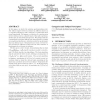Free Online Productivity Tools
i2Speak
i2Symbol
i2OCR
iTex2Img
iWeb2Print
iWeb2Shot
i2Type
iPdf2Split
iPdf2Merge
i2Bopomofo
i2Arabic
i2Style
i2Image
i2PDF
iLatex2Rtf
Sci2ools
131
click to vote
PODC
2009
ACM
2009
ACM
The wireless synchronization problem
In this paper, we study the wireless synchronization problem which requires devices activated at different times on a congested single-hop radio network to synchronize their round numbering. We assume a collection of n synchronous devices with access to a shared band of the radio spectrum, divided into F narrowband frequencies. We assume that the communication medium suffers from unpredictable, perhaps even malicious interference, which we model by an adversary that can disrupt up to t frequencies per round. Devices begin executing in different rounds and the exact number of participants is not known in advance. We first prove a lower bound, demonstrating that at least Ω “ log2 n (F−t) log log n + Ft F−t log n ” rounds are needed to synchronize. We then describe two algorithms. The first algorithm almost matches the lower bound, yielding a running time of O “ F F−t log2 n + Ft F−t log n ” rounds. The second algorithm is adaptive, terminating in O ` t log3 n ´ r...
Related Content
| Added | 08 Mar 2010 |
| Updated | 08 Mar 2010 |
| Type | Conference |
| Year | 2009 |
| Where | PODC |
| Authors | Shlomi Dolev, Seth Gilbert, Rachid Guerraoui, Fabian Kuhn, Calvin C. Newport |
Comments (0)

